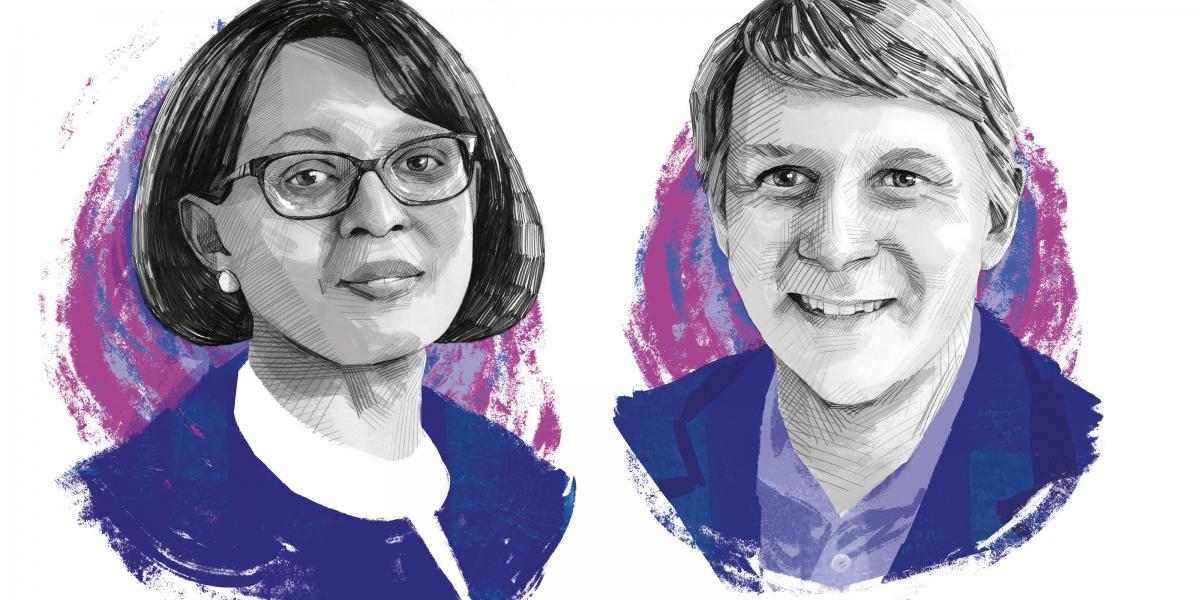WHO’s Matshidiso Moeti and IVAC Director William Moss Talk Progress and Challenges in Africa’s Health Care
Past progress fuels future hopes for African health, WHO’s Matshidiso Moeti tells Epidemiology’s William Moss.
Matshidiso Moeti is optimistic. WHO'S regional director for Africa, Moeti, MBBS, MSc, has 35 years of experience and has seen (and helped lead) much of the region’s extensive progress in health. She is confident that Africa’s 54 countries will continue on that trajectory though, they still face significant obstacles.
How can universal health coverage be achieved in Africa? What outbreaks most concern her? What’s the best way to address vaccine-preventable diseases? William Moss, MD, Epidemiology professor and the new director of the International Vaccine Access Center, draws on his own three decades of experience working in Africa in conversation with Moeti.
William Moss: To many people, the challenges of achieving universal health coverage in the African region seem insurmountable. I wanted to get your thoughts on the efforts you’ve been leading.
Matshidiso Moeti: I think it’s true that Health for All and universal health coverage are ambitious goals. I’m optimistic about the progress that African countries can make. If we look at the Millennium Development Goals … there was significant progress made in reducing maternal and child deaths, and in reducing deaths from HIV/AIDS. Our colleagues in health systems recently published a report that found, for example, life expectancy in the region increased between 2012 and 2015 from 50.9 to 53.8 years. I find that to be a very encouraging figure, showing that it is possible to make progress in very challenging circumstances.
WM: You’ve been leading an effort to implement transformation initiatives and improve management and accountability at the regional level and within countries. What are some of your accomplishments?
MM: We decided to be much more focused on delivering results ourselves at WHO in what we are doing to support countries, which means we have had to develop some key performance indicators and improve the ways in which we are managing the organization.
My ambition personally is to make sure that in the day-to-day management of our work we assure ourselves that everything that we do, every decision that is made, every investment that is made, is bringing us closer to delivering the result that we committed to deliver in our biennial plan.
WM: I know you’re a big proponent of supporting women in public health and women scientists. Could you tell us about your strategies for increasing the role of women in public health?
MM: That’s something that’s close to my heart and a challenge that needs collective effort not only from me and women leaders, but from leaders in public health across the board. It is also important to work with coalitions that promote women in global health.
Within WHO itself, this is something that our new Director-General Tedros is working on, particularly at the senior level. As part of our transformation program in the regional office, we have very much improved the way in which we go about hiring staff. We make sure that women who have applied are being given a fair chance of being considered for the position. We have also made outreach, in terms of attracting women to WHO, a priority. In the last few years we have recruited more women than we have recruited in the past.
I very much hope to see more women in senior positions at WHO.
WM: There’s a lot of news about the Ebola outbreak in the Eastern DRC right now, but what are the outbreaks outside of the news that you’re most concerned about?
MM: In any one year in the African region, we help with over 100 outbreaks of different size and complexity and duration. We are seeing many cholera outbreaks in a number of countries across the region. This shows the importance of the multisectoral work that we are promoting around the availability of water and sanitation. That’s one example.
We’ve seen also outbreaks in other countries, such as Lassa fever in Nigeria and a very serious yellow fever outbreak in Angola, which spread to the DRC.
WM: We’re based at a school of public health in the United States. How can schools of public health outside of the African region help you the most?
MM: Oh, wow. I think clearly partnership with WHO. We can work together—bringing WHO’s knowledge of different countries and schools of public health’s expertise in carrying out research, generating data, building the capacity to do these kinds of things and helping to drive some of the policy dialogue and decision-making.
WM: I recently took over leadership of the International Vaccine Access Center here at the Bloomberg School. What are the opportunities and challenges to addressing vaccine-preventable diseases in the Africa region? I’m thinking particularly about the new malaria vaccine, the RTS,S vaccine.
MM: I think it’s a very exciting opportunity to add that intervention for malaria, especially since we are concerned about the plateauing of progress in malaria. I am very much looking forward to the piloting of this malaria vaccine in a number of countries in real-life settings. We’ve had the opportunity to try out Ebola vaccines in the field now in the DRC in the current outbreak. I think those types of initiatives are very exciting, particularly to help us speed up the deployment of new vaccines.
